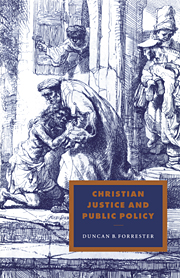Book contents
- Frontmatter
- Contents
- General editors' preface
- Preface
- Introduction
- PART I JUSTICE IN DISPUTE
- PART II POLICIES AND PRACTICES
- PART III THEORIES AND THEOLOGIES
- PART IV THEOLOGICAL FRAGMENTS
- 8 Lively and truthful survivals?
- 9 Love, justice and justification
- 10 Justice and community
- 11 The hope of justice
- Select bibliography
- Subject index
- Name index
- CAMBRIDGE STUDIES IN IDEOLOGY AND RELIGION
9 - Love, justice and justification
Published online by Cambridge University Press: 02 November 2009
- Frontmatter
- Contents
- General editors' preface
- Preface
- Introduction
- PART I JUSTICE IN DISPUTE
- PART II POLICIES AND PRACTICES
- PART III THEORIES AND THEOLOGIES
- PART IV THEOLOGICAL FRAGMENTS
- 8 Lively and truthful survivals?
- 9 Love, justice and justification
- 10 Justice and community
- 11 The hope of justice
- Select bibliography
- Subject index
- Name index
- CAMBRIDGE STUDIES IN IDEOLOGY AND RELIGION
Summary
Christians believe in a God of justice and of love; and more, they teach that God is justice as God is love. In our experience of God we encounter both love and justice and learn what they are. Christians therefore claim, however tentatively and provisionally, to know what justice is because God reveals himself as justice and as love. The insights into justice which arise from revelation, in worship and in experience, are often fragmentary and frequently hard to relate to conventional accounts of what it is. But because they believe these insights are true, Christians down the ages have sought to relate them to the accounts of justice which prevail in the public realm and have struggled with questions of how and when justice may be realised.
In this chapter I discuss the question of the relationship between the justice that is known in justification and the justice that should be acknowledged and applied in daily life and in public policy. Can the justice of God that is known and celebrated in Christian worship be confined to some ritual or sacred dimension of life, or is it simply a matter of the relation between God and the individual soul? What is the relation between God's justice and the relative justice which seems to be the best that can be hoped for in a fallen world? What is the relation between justice and love? Is Christian theology capable of suggesting an enrichment and enlargement of the understanding of justice which might make it more serviceable as, in Rawls's terms, ‘the first virtue of social institutions, as truth is of systems of thought’?
- Type
- Chapter
- Information
- Christian Justice and Public Policy , pp. 205 - 229Publisher: Cambridge University PressPrint publication year: 1997



